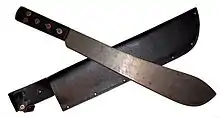bolo
See also: BOLO
English

bolo machetes
Etymology 1
From Philippine Spanish.
Noun
bolo (plural bolos)
Verb
bolo (third-person singular simple present bolos, present participle boloing, simple past and past participle boloed)
Etymology 2
Supposedly named after Bolo Pascha, a German agent in France during World War I.
Verb
bolo (third-person singular simple present bolos, present participle boloing, simple past and past participle boloed)
- To fail to meet the minimum standards of marksmanship.
Verb
bolo (third-person singular simple present bolos, present participle boloing, simple past and past participle boloed)
- (transitive, nonce word) To dress (somebody) in a bolo.
- 1907, Robert William Chambers, chapter I, in The Younger Set, New York, N.Y.: D. Appleton & Company, OCLC 24962326:
- Selwyn, sitting up rumpled and cross-legged on the floor, after having boloed Drina to everybody's exquisite satisfaction, looked around at the sudden rustle of skirts to catch a glimpse of a vanishing figure—a glimmer of ruddy hair and the white curve of a youthful face, half-buried in a muff.
-
Alternative forms
Noun
bolo (plural bolos)
- (US law enforcement) A request for law enforcement officers to be on the lookout for a suspect.
Synonyms
References
- “bolo” in Dictionary.com Unabridged, Dictionary.com, LLC, 1995–present.
Bambara
Galician
Etymology 1
Unknown.
Pronunciation
- IPA(key): /ˈbɔlo̝/
Pronunciation
- IPA(key): /ˈbolo̝/
Noun
bolo m (plural bolos)
- bun, roll
- 1409, J. L. Pensado Tomé (ed.), Tratado de Albeitaria. Santiago de Compostela: Centro Ramón Piñeiro, page 129:
- Para esto ual o ouo torrado ataa que se faça duro et depois tollelle a casca et faz tal como bollo
- For this you must use egg, roasted till its hard; remove then the shell and make a roll with it
- Para esto ual o ouo torrado ataa que se faça duro et depois tollelle a casca et faz tal como bollo
- 1409, J. L. Pensado Tomé (ed.), Tratado de Albeitaria. Santiago de Compostela: Centro Ramón Piñeiro, page 129:
- piece of bread
- 1396, M. Romaní Martínez (ed.), La colección diplomática de Santa María de Oseira (1025-1310). Santiago: Tórculo Edicións, page 449:
- daredes hun dia de seara de cada anno en a nosa granja de Vales, e hun bolo de triigo
- and you'll give a day of work each year at our farm of Vales, and a piece of wheat bread
- daredes hun dia de seara de cada anno en a nosa granja de Vales, e hun bolo de triigo
- 1396, M. Romaní Martínez (ed.), La colección diplomática de Santa María de Oseira (1025-1310). Santiago: Tórculo Edicións, page 449:
- ball of butter
- Synonym: pela
- lump
- Synonym: grumo
- clod
- Synonym: terrón
- pebble
- Synonym: croio
Derived terms
- bolo do pote (“dumpling”)
- furabolos (“forefinger”, literally “bun-piercer”)
Related terms
References
- “bolo” in Xavier Varela Barreiro & Xavier Gómez Guinovart: Corpus Xelmírez - Corpus lingüístico da Galicia medieval. SLI / Grupo TALG / ILG, 2006-2016.
- “bolo” in Dicionario de Dicionarios da lingua galega, SLI - ILGA 2006-2013.
- “bolo” in Tesouro informatizado da lingua galega. Santiago: ILG.
- “bolo” in Álvarez, Rosario (coord.): Tesouro do léxico patrimonial galego e portugués, Santiago de Compostela: Instituto da Lingua Galega.
Italian
Etymology
From Late Latin bōlus (“clod of earth, lump”), from Ancient Greek βωλος (bōlos, “clod, lump”).
Pronunciation
- Rhymes: -ɔlo
Portuguese
.jpg.webp)
bolo (1.1)
Etymology 1
From bola.
Noun
bolo m (plural bolos)
Derived terms
- bolo alimentar / bolo alimentício
- bolo histérico
- dar o bolo
Descendants
- Kabuverdianu: bolu
Etymology 2
Non-lemma forms.
Spanish
Pronunciation
- IPA(key): /ˈbolo/
Derived terms
Related terms
Etymology 2
A shortening of bolívar.
Further reading
- “bolo” in Diccionario de la lengua española, Vigésima tercera edición, Real Academia Española, 2014.
This article is issued from Wiktionary. The text is licensed under Creative Commons - Attribution - Sharealike. Additional terms may apply for the media files.
